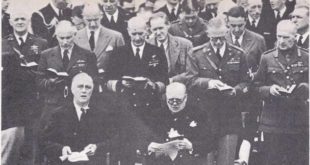Andrei was carving a wooden sleigh. So expert was he in the use of a knife that he could make a toy sleigh, driver and all, in two long winter evenings. Another night would be enough for the horse, which wasn’t difficult, but Andrei always had a hard time with the yoke that went over the neck. The yoke was shaped like a big wishbone and Andrei could never understand why Russian horses wore such high and heavy yokes. “Just like us peasants!” thought Andrei, “We too carry heavy burdens and are little more than slaves.” Andrei thought many things …
Read More »Tag Archives: Finland
The United Nations and the End of Colonialism 1946 -1965
Even before the Korean War, the United Nations had proved that it could take effective action to control serious conflicts. It first took such action in the conflict over Palestine. During World War I, the British had ousted the Turks from Palestine. When the war was over, the League of Nations placed that land under the authority of Britain. The British then issued the famous Balfour Declaration, which promised the Jewish people that Palestine would someday become their homeland, but the Arabs of Palestine and the surrounding countries strongly objected to this and year after year passed without the British …
Read More »A World at War 1939 – 1941
Now the people of Europe began to hear a new sound, a sound that would haunt them throughout the years of war — the wail and shriek of air-raid sirens. At night, the lights of Europe went out and the “blackout” made familiar streets strange places of darkness. Street lamps were left unlit and windows were covered with heavy draperies. Any stray gleam of light might help guide enemy bombers to their targets. Hurrying about their wartime duties, the people of Britain and France began to wonder. They had not wanted war and yet war had come. Why? What had …
Read More »Victory in Europe 1941 – 1945
Even before Pearl Harbour, there had been cooperation between the United States and Britain. In August of 1941, President Roosevelt and Prime Minister Churchill met secretly, on a cruiser at sea off the coast of Newfoundland. There they drew up the Atlantic Charter, a document stating the principles on which they based their hopes for a better future for the world. They pledged that neither country would seek more territory. They hoped that, “after the final destruction of Nazi tyranny,” all men in all lands could “live out their lives in freedom from want and fear,” and they called on …
Read More »Totalitarianism Versus Democracy
AS THE 1930’s drew to a close, only eight countries in Europe, besides Great Britain and France, were still democracies. They were Belgium, Holland, Switzerland, Czechoslovakia, Norway, Sweden, Denmark and Finland. Three of Europe’s most important nations were dictatorships. The Soviet Union was communist; Germany and Italy were fascist. There had been dictatorships before, but these went further; they were totalitarian. The word “totalitarian” comes from the word “total,” and total control is what these dictatorships were after — total control of their people, total control of their actions and thought. There were differences between the totalitarian countries. While Stalin …
Read More »Peace-and Civil War 1917 -1924
SPEAKING BEFORE the Congress of Soviets on November 8, the second day of the November revolution, Lenin had said, “We shall now proceed to construct the Socialist order.” Constructing any kind of order in a vast country like Russia would not be easy. The Bolsheviks had won the support of the soviets, but could they win the support of all Russia? As a matter of fact, not all the people in the country known as Russia were Russians. The tsars had gathered in under their rule many territories. On these territories lived people of many different nationalities, each speaking a …
Read More »The November Revolution 1917
LENIN’S REAL name was Vladimir Ilyich Ulianov. Like most Russian revolutionaries, he had taken another name to protect himself from the Police. He looked like anything but a leader of men; someone once said he looked more like a small-town grocer. He was short, stocky, bald and wore a small heard. His clothes were shabby and his pants were usually too long. He was not a great orator but he had a gift for simplifying and explaining complicated questions, which made him an effective speaker before crowds. Lenin was born in 1870, the son of a schoolteacher who became an …
Read More »After the Peace of Paris 1919 – 1920
DURING THE war, three great empires — the Russian, the Austro-Hungarian and the German –had vanished forever. Then, by the Treaty of Sévres, a fourth empire, the Ottoman, was quietly put to death. Turkey was confined to Asia Minor and became a republic. Of its former possessions, the League of Nations assigned Syria and Lebanon to France and Palestine and Iraq to Great Britain. Trans-Jordan and Saudi Arabia, which had fought the Turks under an adventurous British colonel named T. E. Lawrence, became independent kingdoms. In Europe, there were seven new states: Finland, Estonia, Latvia, Lithuania, Poland, Czechoslovakia and Yugoslavia. …
Read More »






